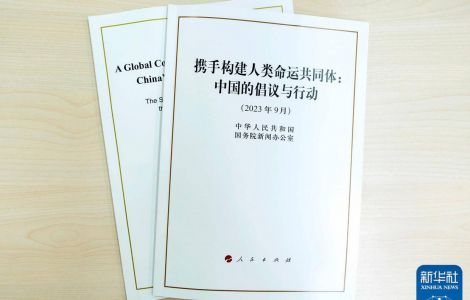中英对照:白皮书《携手构建人类命运共同体:中国的倡议与行动》 [12]
A Global Community of Shared Future: China's Proposals and Actions [12]
构建人类命运共同体理念,反映了和平发展、团结共生、合作共赢等不同文明之间的互通之处。俄罗斯有谚语“风雨同舟就能无惧风雨”;瑞士有作家提出“不应为战争和毁灭效劳,而应为和平与谅解服务”;德国有谚语“一个人的努力是加法,一个团队的努力是乘法”;非洲有谚语“一根原木盖不起一幢房屋”;阿拉伯有谚语“独行快,众行远”;墨西哥诗人有名句“唯有益天下,方可惠本国”;印度尼西亚有谚语“甘蔗同穴生,香茅成丛长”;蒙古国有谚语“邻里心灵相通,命运与共”等等。这些都体现了深厚的世界文化渊源和丰富的思想底蕴。
The concept of a global community of shared future reflects the common interests of all civilizations – peace, development, unity, coexistence, and win-win cooperation. A Russian proverb holds, “Together we can weather the storm.” The Swiss-German writer Hermann Hesse proposed, “Serve not war and destruction, but peace and reconciliation.” A German proverb reads, “An individual’s effort is addition; a team’s effort is multiplication.” An African proverb states, “One single pillar is not sufficient to build a house.” An Arabian proverb asserts, “If you want to walk fast, walk alone; if you want to walk far, walk together.” Mexican poet Alfonso Reyes wrote, “The only way to be profitably national is to be generously universal.” An Indonesian proverb says, “Sugarcane and lemongrass grow in dense clumps.” A Mongolian proverb concludes, “Neighbors are connected at heart and share a common destiny.” All the above narratives manifest the profound cultural and intellectual essence of the world.
构建人类命运共同体理念,以公认的国际关系基本原则为遵循。近代以来,建立公正合理的国际秩序是人类孜孜以求的目标。从《威斯特伐利亚和约》确立的平等和主权原则,到日内瓦公约确立的国际人道主义精神;从联合国宪章明确的四大宗旨和七项原则,到万隆会议倡导的和平共处五项原则,这些国际关系演变积累的公认原则,成为构建人类命运共同体的重要基础。
In building a global community of shared future, all countries should observe the widely acknowledged norms of international relations. Since the advent of modern times, a fair and equitable international order has been the long-standing goal of all humanity. From the principle of equity and sovereignty established by the Peace of Westphalia in 1648, to international humanitarianism established by the Geneva Conventions in 1864, then to the four purposes and seven principles established by the Charter of the United Nations in 1945, and later to the Five Principles of Peaceful Coexistence proposed at the Bandung Conference in 1955, these norms of international relations have evolved into widely recognized principles and become the essential foundations of a global community of shared future.
四、既有目标方向,也有实现路径
IV. Direction and Path
构建人类命运共同体,是中国从世界和平与发展的大势出发处理当代国际关系的中国智慧,是完善全球治理的中国方案,是应对21世纪的各种挑战的中国主张。理念引领行动,方向决定出路,国际社会应当携手努力,把宏伟蓝图变成路线图,一步一个脚印把美好愿景变为现实。
The vision of a global community of shared future is the outcome of China’s wisdom in handling contemporary international relations from the perspective of world peace and development – a Chinese plan for improving global governance, and a Chinese proposal to address various challenges in the 21st century. Vision guides action and direction determines the future. The international community should work together to turn the grand blueprint into a roadmap, and a beautiful vision into reality step by step.
(一)推动新型经济全球化
1. Pressing ahead with a new type of economic globalization
经济全球化是世界经济发展的必然趋势,契合各国人民要发展、要合作的时代潮流。历史上的经济全球化,促成了贸易大繁荣、投资大便利、人员大流动、技术大发展,为世界经济发展作出了重要贡献。
Economic globalization is an irreversible trend of global economic development, and is in line with the desire for development and cooperation held by people of all countries. Economic globalization has greatly facilitated trade, investment, flows of people, and technological advances, making an important contribution to global economic development.
但是,经济全球化也积存了不少问题和弊端,出现“回头浪”。目前的经济全球化模式,难以反映广大发展中国家呼声、体现广大发展中国家利益;“弱肉强食”的丛林法则和“你输我赢”“赢者通吃”的零和博弈,造成富者愈富、贫者愈贫,发达国家与发展中国家以及发达国家内部的贫富差距越拉越大;个别国家把内部治理问题归咎于经济全球化,归咎于其他国家,动辄采取单边主义、保护主义、霸凌主义,破坏全球产业链、价值链、供应链、消费链,导致现有国际贸易秩序紊乱甚至冲突。
However, problems and drawbacks also accumulated in the process, and there are attempts at retreating from it. The current model of economic globalization fails to reflect the demands or represent the interests of developing countries. The law of the jungle, zero-sum game, and the “win-or-lose”, “winner-takes-all” mindset have exacerbated the divide between the rich and poor, as evidenced by the widening gap between developed and developing countries, and that within developed countries. Some countries blame their problems in domestic governance on economic globalization or other countries, and resort to unilateral, protectionist, and bullying actions. This has damaged global industrial, value, supply and consumption chains, and caused turbulence and even conflict in the current international trade order.
推动新型经济全球化,是构建人类命运共同体的必然要求。各国应该坚持开放的政策取向,旗帜鲜明反对保护主义,反对“筑墙设垒”,反对单边制裁、极限施压,推动各国经济联动融通,共同建设开放型世界经济。各国应该推动构建公正、合理、透明的国际经贸规则体系,推进贸易和投资自由化便利化,促进全球经济进一步开放、交流、融合,推动形成开放、包容、普惠、平衡、共赢的经济全球化,让各国人民共享经济全球化和世界经济增长成果。
Promoting a new type of economic globalization is essential for building a global community of shared future. Countries need to pursue a policy of openness and explicitly oppose protectionism, the erection of fences and barriers, unilateral sanctions, and maximum-pressure tactics, so as to connect economies and jointly build an open world economy. Countries should strive to build a system of fair, reasonable, and transparent international economic and trade rules, press ahead with trade and investment liberalization and facilitation, and promote further global economic openness, exchange, and integration in order to form an economic globalization that is open, inclusive, balanced and beneficial for all, so that people of all countries can share the fruits of economic globalization and world economic growth.
开放应是双向奔赴,不能是单行道,不能一边要求别的国家开放,一边关闭自己的大门。一些国家总想对中国实行“脱钩断链”,构筑“小院高墙”,最终只会反噬自身。一些人炒作要“降依赖”“去风险”,这样的做法实质是制造新的风险。防风险和合作不是对立的,不合作才是最大的风险,不发展才是最大的不安全。如果以“去风险”“降依赖”之名行“去中国化”之实,就是在去机遇、去合作、去稳定、去发展。
Opening up should be a two-way journey, not a one-way street; one cannot demand the opening of other countries while closing its own doors. Some countries are seeking to decouple from and break chains with China, enclosing themselves in “small yards, high fences”, which will ultimately only backfire on themselves. Some people overstate the need to “reduce dependence” and “derisk”, which is essentially creating new risks. Risk prevention and cooperation are not mutually contradictory, whereas non-cooperation is the biggest risk and non-development is the biggest threat to security. Pursuing de-sinicization in the name of derisking and reducing dependence undermines opportunities, cooperation, stability, and development.
当前正在发生的以人工智能为标志的科技革命,将对新一轮经济全球化和人类社会发展产生难以估量的深刻影响。要探索建立相关规则和标准,既有利于科学技术的创新发展,又坚守人类安全底线,还要平衡照顾各国特别是发展中国家利益,确保技术创新在法治轨道和公认的国际准则基础上运行,由人类主导、为人类服务、符合人类价值观。
The current revolution in science and technology marked by artificial intelligence will have a profound impact on the new round of economic globalization and social development. Relevant rules and standards should be established to support scientific and technological innovation and guard the red line of human security. The interests of all countries, especially developing ones, should be taken into account in a balanced manner, to ensure that technological innovation is placed under the rule of law and internationally recognized norms, and ensure that innovation is steered by and works for humanity, and is consistent with human values.
注:为确保中英对照准确,“热词译”网站可能对中英文重新分段。

